battling-impunity-hanging-photo-mw19-collection
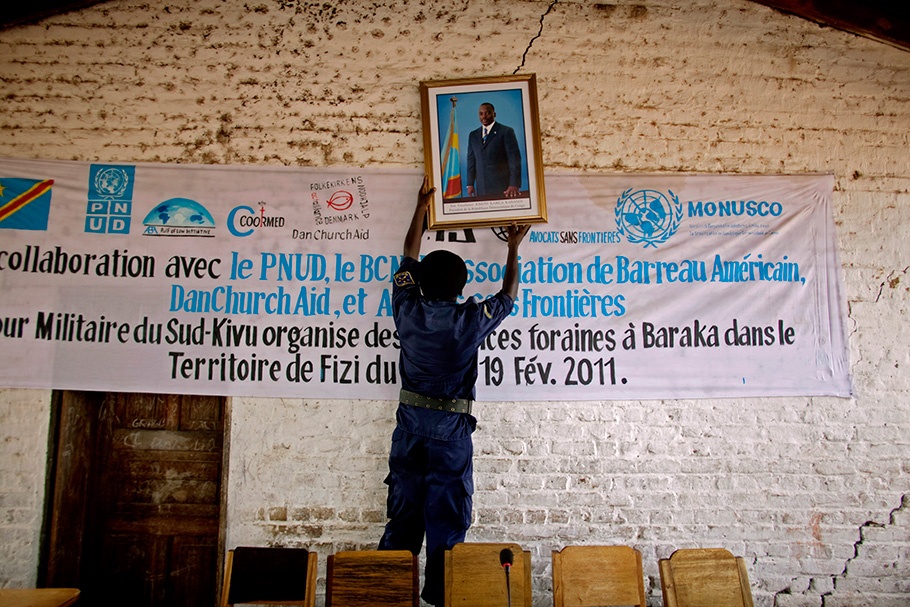
A bailiff hangs a photo of Congo's president, Joseph Kabila, on the main courtroom wall. February 2011.
battling-impunity-policewoman-mw19-collection
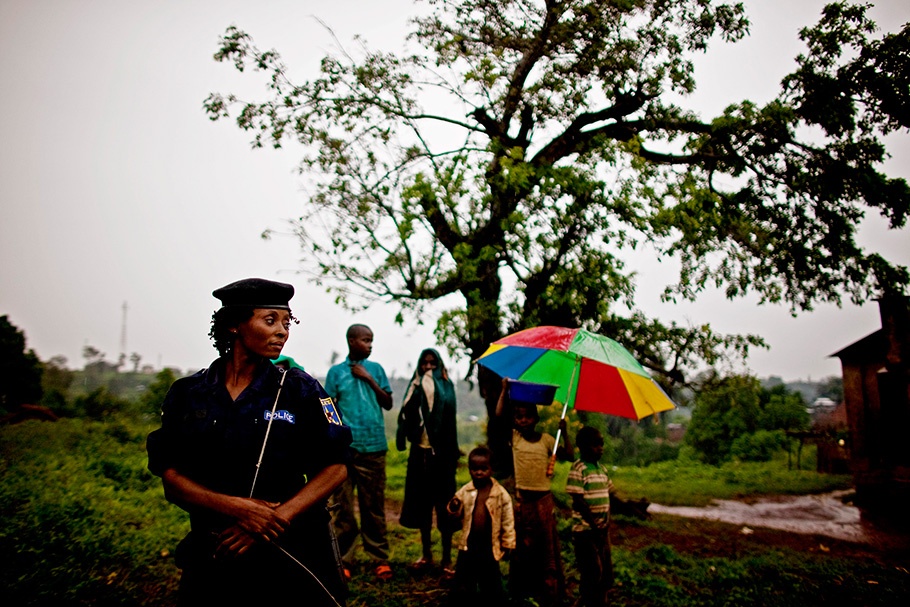
A Congolese policewoman stands guard in the town of Fizi. A significant number of Lt. Col. Kibibi's forces and other armed elements remain at large around the town. Residents fear that without drastic intervention, similar crimes will occur in the future. February 2011.
battling-impunity-kibibi-mw19-collection
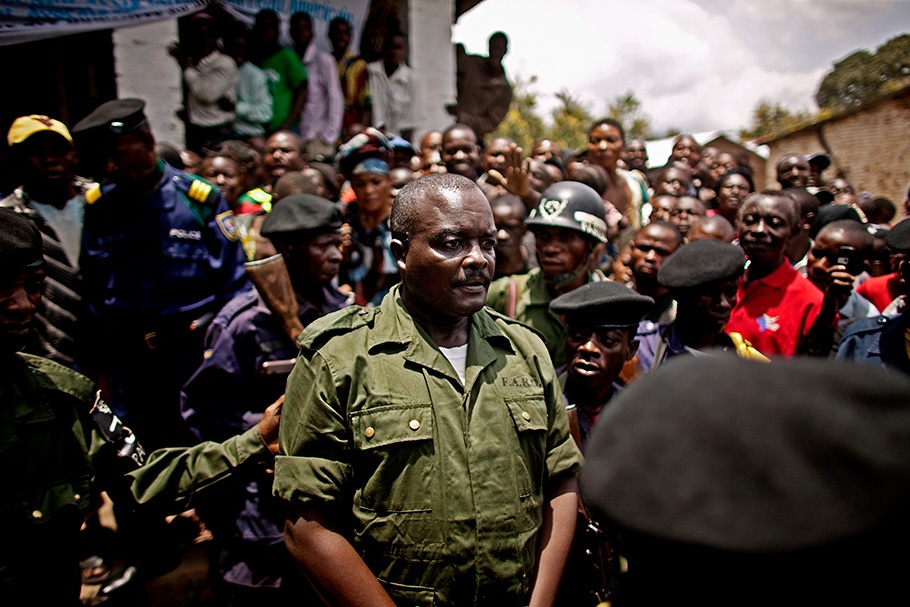
After receiving a twenty-year prison sentence, Kibibi is led out of the courtroom amid jeers and chants. Many in the crowd felt that the sentence was too light. “He should be killed for his crimes,” one woman exclaimed.
battling-impunity-witness-testifying-mw19-collection
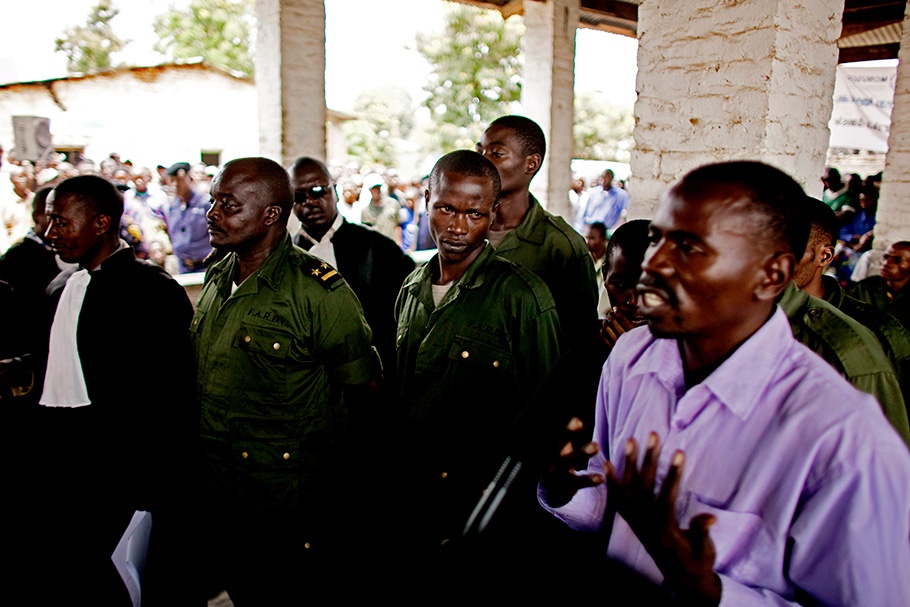
Sido Bizinungu (center), a close associate of Lt. Col. Kibibi (left), glares at a witness as the latter testifies against soldiers. The witness explained that Kibibi’s soldiers looted his shop and brutally assaulted him during their rampage. Witnesses testifying against such hardened fighters in open court had tremendous courage, since there were no assurances that their testimony would lead to convictions. February 2011.
battling-impunity-defense-attorneys-mw19-collection
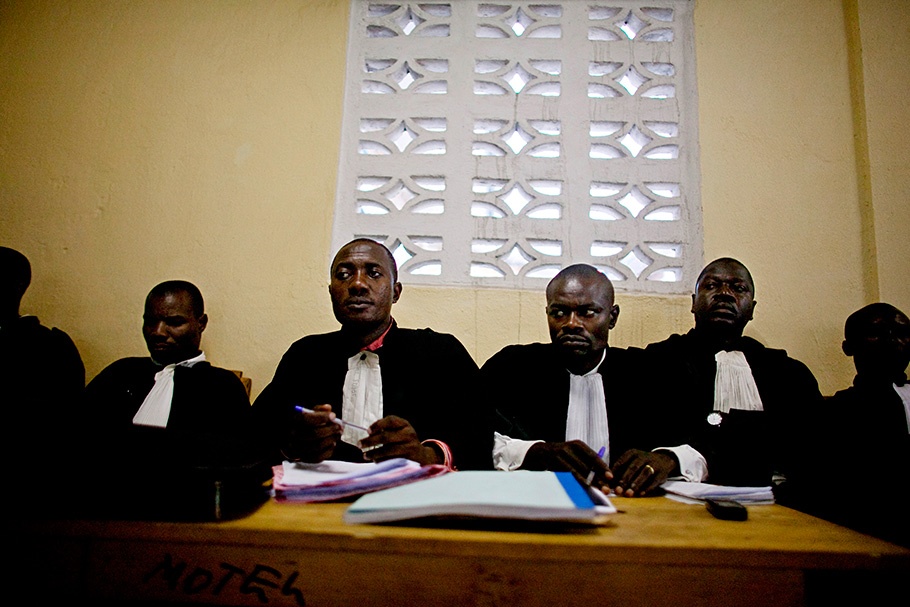
Defense attorneys listen to rape survivors testifying against Lt. Col. Kibibi and his men during a single day of closed sessions in the trial. Nearly 50 women came forward to recount the brutal rapes they had survived. The court withheld the women’s names for their security and referred to them only as F1 thru 50. February 2011.
battling-impunity-observers-mw19-collection
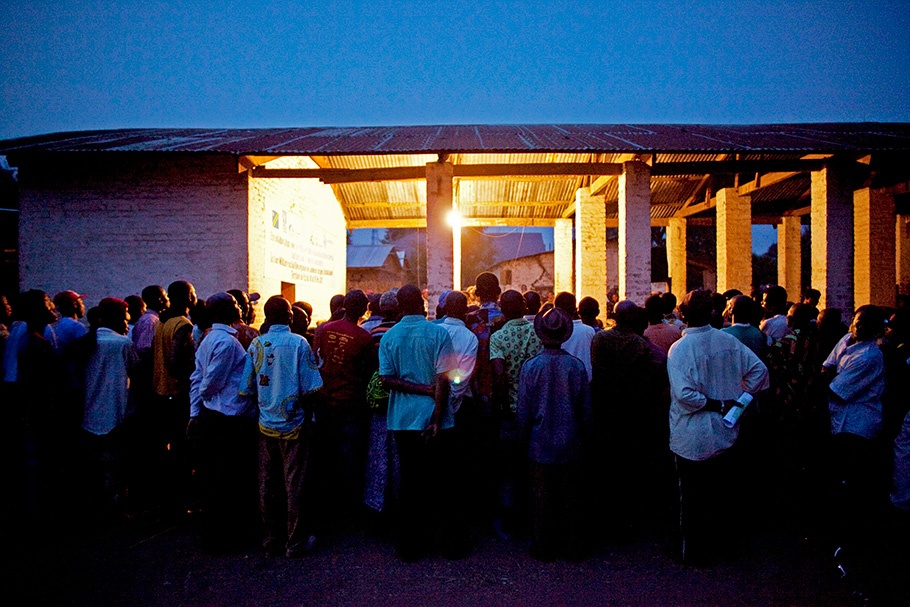
The daily proceedings often went on for nearly 10 hours. Despite the length, many observers stayed to watch until after dark. February 2011.
battling-impunity-rape-survivor-blue-mw19-collection
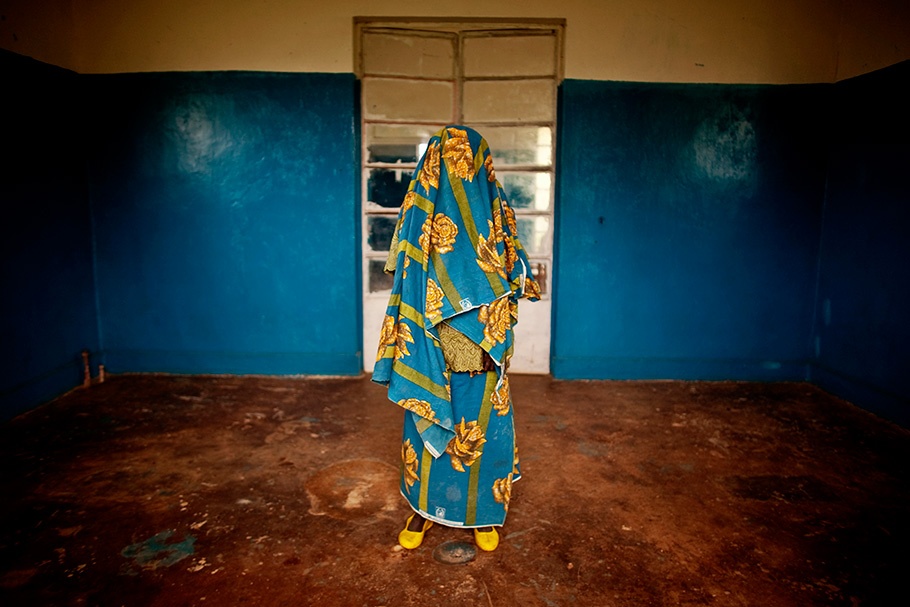
A survivor of Lt. Col. Kibibi's mass rape campaign in the town of Fizi. Her identity has been concealed for security reasons and because rape carries strong social stigma in Congo. With dozens of Kibibi’s soldiers still inside Fizi and numerous militias in the surrounding hills, women live in a constant state of fear. “If we go to the fields, we get raped. If we take our goods to sell in the markets, we get raped,” explains one survivor. “There is danger everywhere for women.” February 2011.
battling-impunity-rape-survivor-flowers-mw19-collection
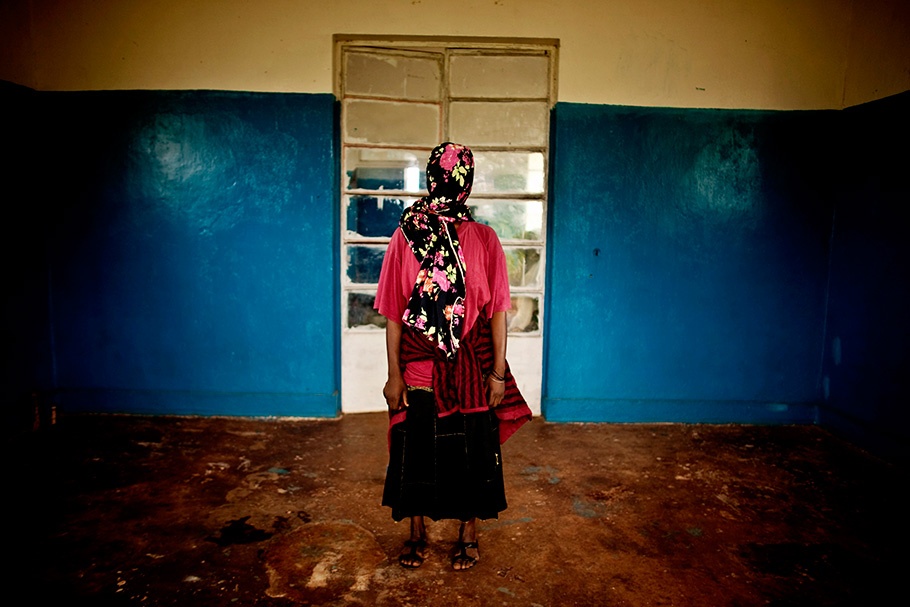
A survivor of Lt. Col. Kibibi's mass rape campaign in the town of Fizi. Her identity has been concealed for security reasons and because rape carries strong social stigma in Congo. With dozens of Kibibi’s soldiers still inside Fizi and numerous militias in the surrounding hills, women live in a constant state of fear. “If we go to the fields, we get raped. If we take our goods to sell in the markets, we get raped,” explains one survivor. “There is danger everywhere for women.” February 2011.
battling-impunity-rape-survivor-jacket-mw19-collection
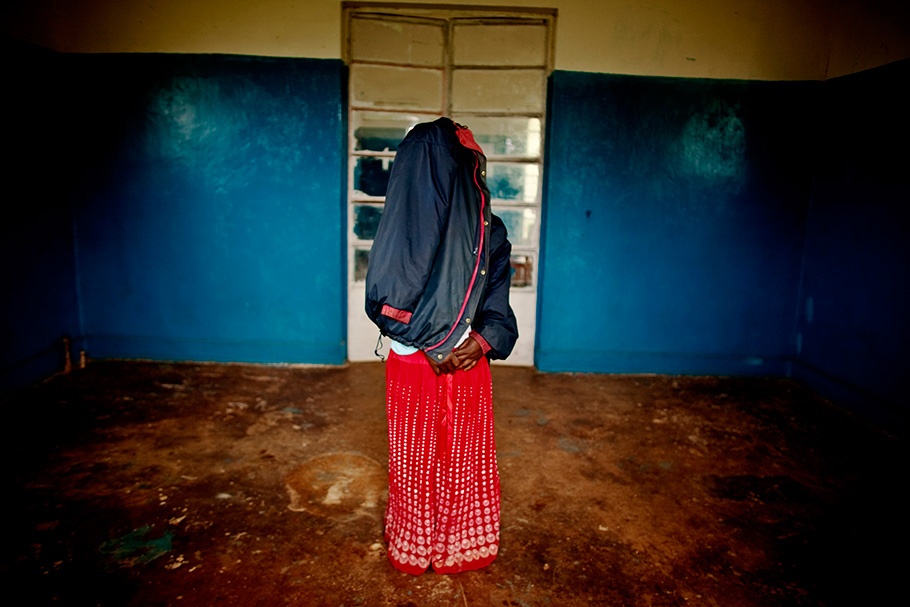
A survivor of Lt. Col. Kibibi's mass rape campaign in the town of Fizi. Her identity has been concealed for security reasons and because rape carries strong social stigma in Congo. With dozens of Kibibi’s soldiers still inside Fizi and numerous militias in the surrounding hills, women live in a constant state of fear. “If we go to the fields, we get raped. If we take our goods to sell in the markets, we get raped,” explains one survivor. “There is danger everywhere for women.” February 2011.
battling-impunity-rape-survivor-rainbow-mw19-collection
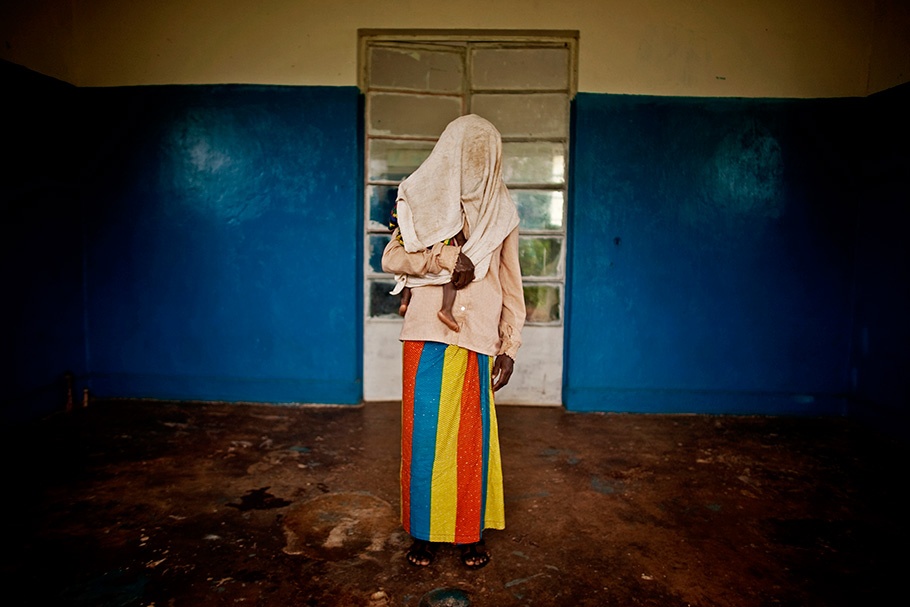
A survivor of Lt. Col. Kibibi's mass rape campaign in the town of Fizi. Her identity has been concealed for security reasons and because rape carries strong social stigma in Congo. With dozens of Kibibi’s soldiers still inside Fizi and numerous militias in the surrounding hills, women live in a constant state of fear. “If we go to the fields, we get raped. If we take our goods to sell in the markets, we get raped,” explains one survivor. “There is danger everywhere for women.” February 2011.
Since 2005 Pete Muller has focused on documenting the individual consequences of war, poverty, and social unrest. He aims to illustrate these issues through a combination of photography, text, and audio and video recordings.
Muller has worked in the Democratic Republic of Congo, Kenya, northern Uganda, the Palestinian Territories, Somalia, and South Africa. Since 2009, he has been based in southern Sudan working on a long-term project examining South Sudan’s journey to independence. This work explores the political, environmental, and cultural diversity in the new Republic of South Sudan and how the country is grappling with the challenges of nation-state formation in the 21st century. Elements of this project have appeared in Time magazine, the New York Times, the Washington Post, and the Wall Street Journal.
Muller has contributed photography to many news outlets and international organizations including Al Jazeera, Foreign Policy, Greenpeace, the National Geographic Channel, Paris Match, UNIFEM, and UNICEF. He has been a nominee for the 2009 Gay & Lesbian Alliance Against Defamation Media Awards and the 2010 and 2011 Photo District News 30 New and Emerging Photographers to Watch. His work has been exhibited at the Cartagena Summit on a Mine-Free World in 2009, FotoWeek DC in 2009, and the 10th Meeting of the States Parties to the Mine Ban Treaty in Geneva in 2011.
Pete Muller
In the lush hills of eastern Congo, a brutal war rages against women. As rival militias fight for control of territory and resources, militiamen regard women as just one more battlefield prize for them to try to dominate and abuse. The result is that thousands of women are raped each year in eastern Congo, with more than 8,300 reported cases in 2009 alone. Since the 1990s, rape has been legally recognized as a powerful weapon of war, terror, and destruction. These crimes, often committed with impunity, have impacted the lives of hundreds of thousands of women, their families, and their communities.
Since 2010, ranking officials in the Congolese military and government have resolved to intervene in this horrific practice. With support from international organizations, the Congolese military has established and utilized mobile tribunals (both civilian and military) which travel to remote locations to administer justice in areas where lawyers and courts are largely nonexistent. The tribunals, made up of Congolese judges, prosecutors, defense counsel, and civil party attorneys, are capable of operating wherever crimes occur. The presence of women lawyers, judges, and security has been particularly important for female plaintiffs and witnesses.
In February 2011, one such military tribunal tried and convicted Lt. Col. Mutware Daniel Kibibi, the most senior Congolese military officer to ever face charges of rape and crimes against humanity. Lt. Col. Kibibi was accused of orchestrating the systematic rape of more than 60 women and the looting of dozens of homes in the mountaintop village of Fizi on New Year’s Day 2011. After 10 days of agonizing testimony and heated argument, the military judges sentenced Lt. Col. Kibibi and eight of his men to 10, 15, and 20 years imprisonment. Thousands of residents who gathered to observe the trial erupted in cheers as the sentences were handed down. “You thought you would get away with it,” they shouted, as the men were led away. “Now you will pay.”
It was a landmark case in Congo, a clear and decisive message to the roving militias and military units that continue to rape and pillage with regularity. “We believe that we have made our position clear with these convictions,” said Freddy Mukendi, the president of the military court. “These types of criminal acts will no longer go unpunished.” Lt. Col. Kibibi’s senior rank signaled that the tribunals are capable of targeting perpetrators regardless of power and seniority.
The tribunals signify a new era of accountability in Congo’s seemingly endless wars. After decades of impunity, convictions leveled against high-ranking commanders are bound to give pause to the marauding militias whose actions have destroyed so many lives. The tribunals are an initial and important step toward establishing order and upholding the rule of law where it has been absent for decades.
I traveled to eastern Congo to document the courts as a positive development that addresses some of the pain and suffering caused by war. I hope that the images generate discussion on this new and largely underreported effort to reign in the gratuitous violence for which eastern Congo is so notoriously known. These trials demonstrate a clear and genuine commitment by the Congolese themselves to curtailing the lawlessness and violence that have defined the eastern part of the country for decades. I believe that, while these trials are new and limited, they are a vital step in restoring faith in the rule of law.
—Pete Muller, November 2011
Open Society Initiative for Southern Africa (OSISA)
The Open Society Initiative for Southern Africa (OSISA) focuses its work on promoting the rule of law, democracy building, human rights, economic development, education, public health, independent media, and access to information. In the eastern region of the Democratic Republic of Congo, OSISA has supported the American Bar Association’s Rule of Law Program to lead a coalition of African women’s rights activists that is bringing attention to high rates of sexual violence against women. OSISA has also cooperated with the Open Society Justice Initiative in supporting mobile courts that travel across the province of South Kivu in the Democratic Republic of Congo to prosecute members of the Congolese army, rebel groups, and militias who have committed mass rape and acts of sexual violence. So far, the courts have heard 250 cases and issued 195 convictions carrying prison sentences of 3 to 20 years.
Open Society Justice Initiative
The Open Society Justice Initiative uses law to protect and empower people around the world. A key priority for the Justice Initiative is to foster accountability for international crimes such as mass rape and sexual violence. In the Democratic Republic of Congo, the Justice Initiative has cooperated with the Open Society Initiative for Southern Africa to support the development of mobile courts capable of trying the most serious cases of mass rape and other violent crimes in eastern Congo. The mobile court project conducts both civilian and military trials and operates within the Congolese justice system with local judges, prosecutors, and defense counsel.
“Fact Sheet: Democratic Republic of Congo Mobile Gender Courts”
This two-page fact sheet describes the mobile court system—supported by the Open Society Justice Initiative and the Open Society Initiative for Southern Africa—that travels across the eastern parts of the Democratic Republic of Congo to try the most serious cases of mass rape and other crimes.